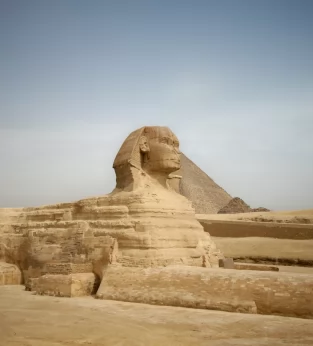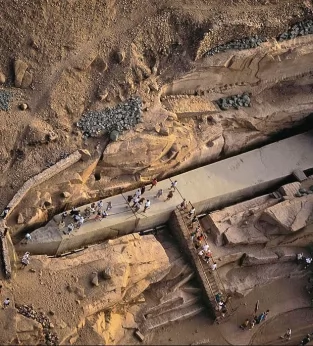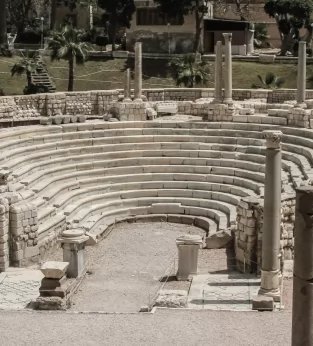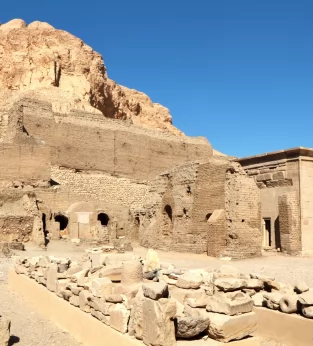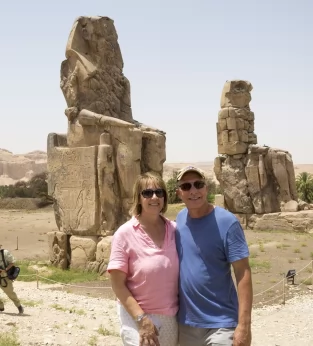The ruins of Memphis are an essential historical site in Egypt, showcasing the grandeur of the former capital of ancient Egypt. The ancient city of Memphis located in the vicinity of Cairo, was a cornerstone of Egyptian civilization and a vital political, religious, and cultural center during its height. According to ancient tradition, Memphis was founded by King Narmer (sometimes called Menes), who unified Upper and Lower Egypt and established the city as the first national capital.
Originally named Ineb-Hedj, meaning "White Walls," the ancient city of Memphis, was recognized by the Greeks as Menefer and by the Egyptians as Hut-ka-Ptah, meaning "this is where the god Ptah created the world." Under Pharaoh Djoser, it became the capital of ancient Egypt, while Pepi I's pyramid in Saqqara was called Men-Nefer-Pepi, solidifying the city's significance.
Memphis thrived during the 4th and 6th dynasties, attracting various cultures, including Syrians, Phoenicians, Greeks, and Jews. It remained influential even after it ceased being the official capital. The renowned Ramses II revitalized the city, enhancing its prosperity.
Despite its decline after the founding of Alexandria in 32 BC and later Arab invasions, the ruins of Memphis still feature significant remnants, including the colossal statue of Ramses II and an alabaster sphinx, both likely from the temple of Ptah.
For those eager to delve into this rich historical tapestry, Inside Egypt offers exclusive, high-end tours designed to combine exploration and education with unforgettable experiences. With intimate groups limited to 20 participants, you will enjoy a personalized service and the expertise of Egyptologists who bring ancient history to life.
These luxury Egypt vacations will immerse you in the fascinating story of Memphis and its profound role in shaping the legacy of ancient Egypt. Don't miss the chance to explore this incredible destination and uncover the wonders of the ancient city of Memphis.
Ready to start your adventure in Egypt? Book your luxury Egypt tour!
Photos of the Ruins of Memphis
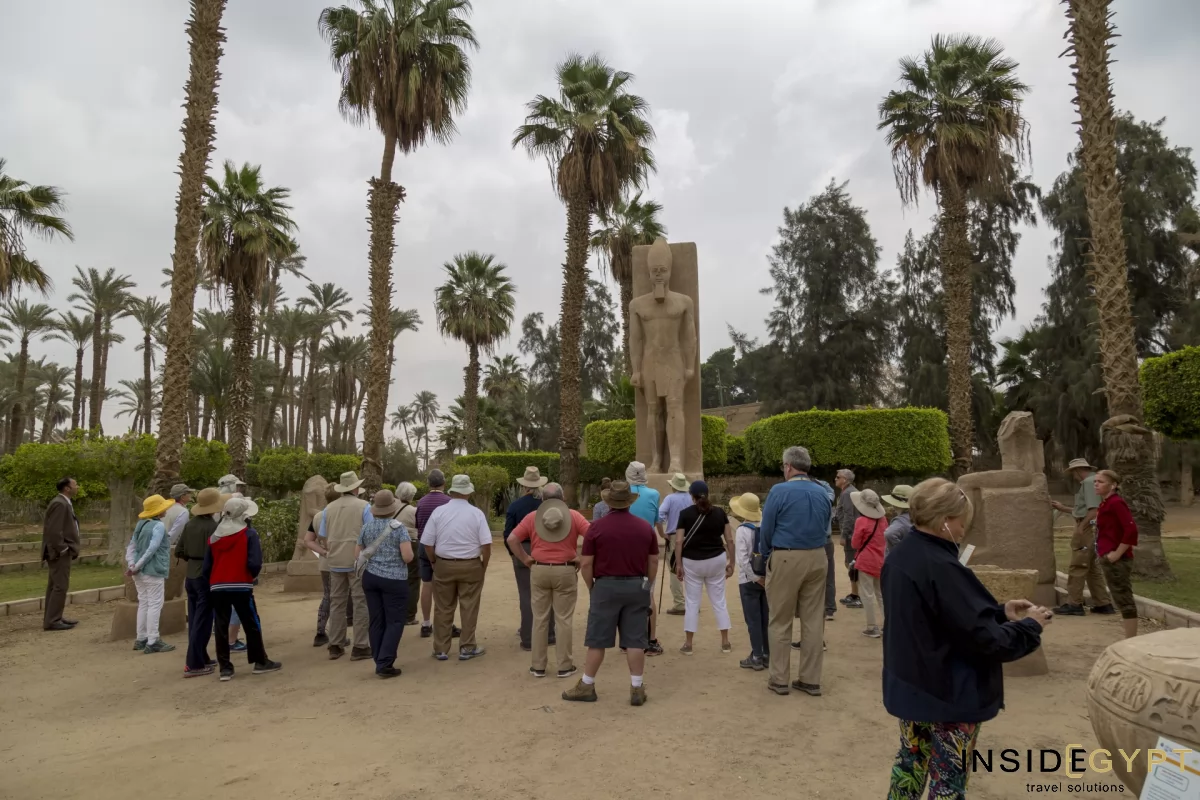
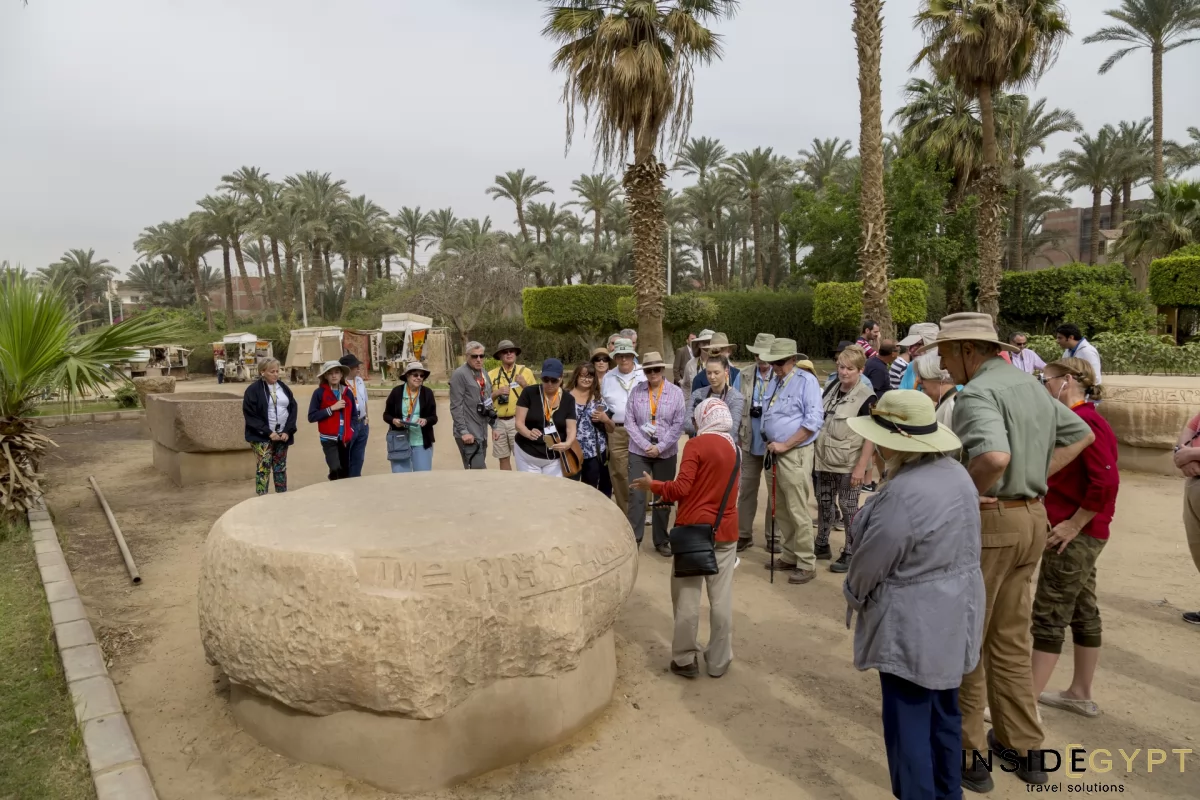
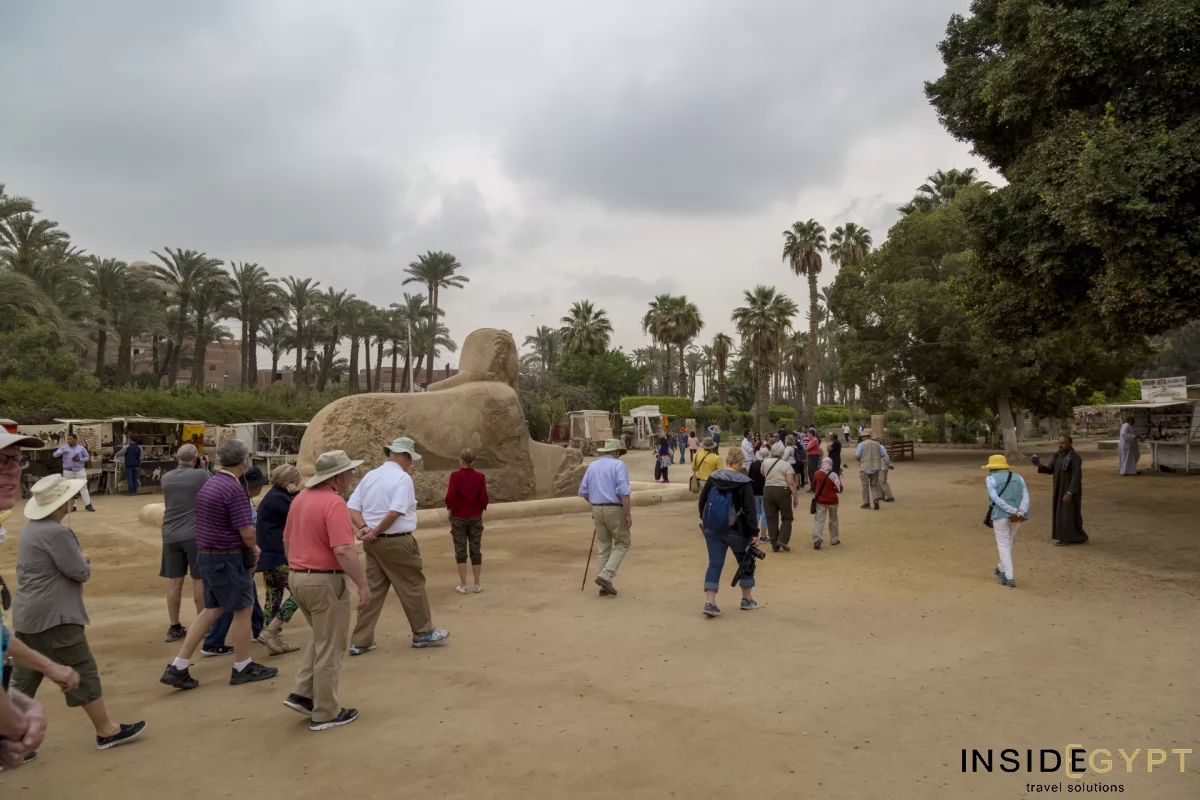


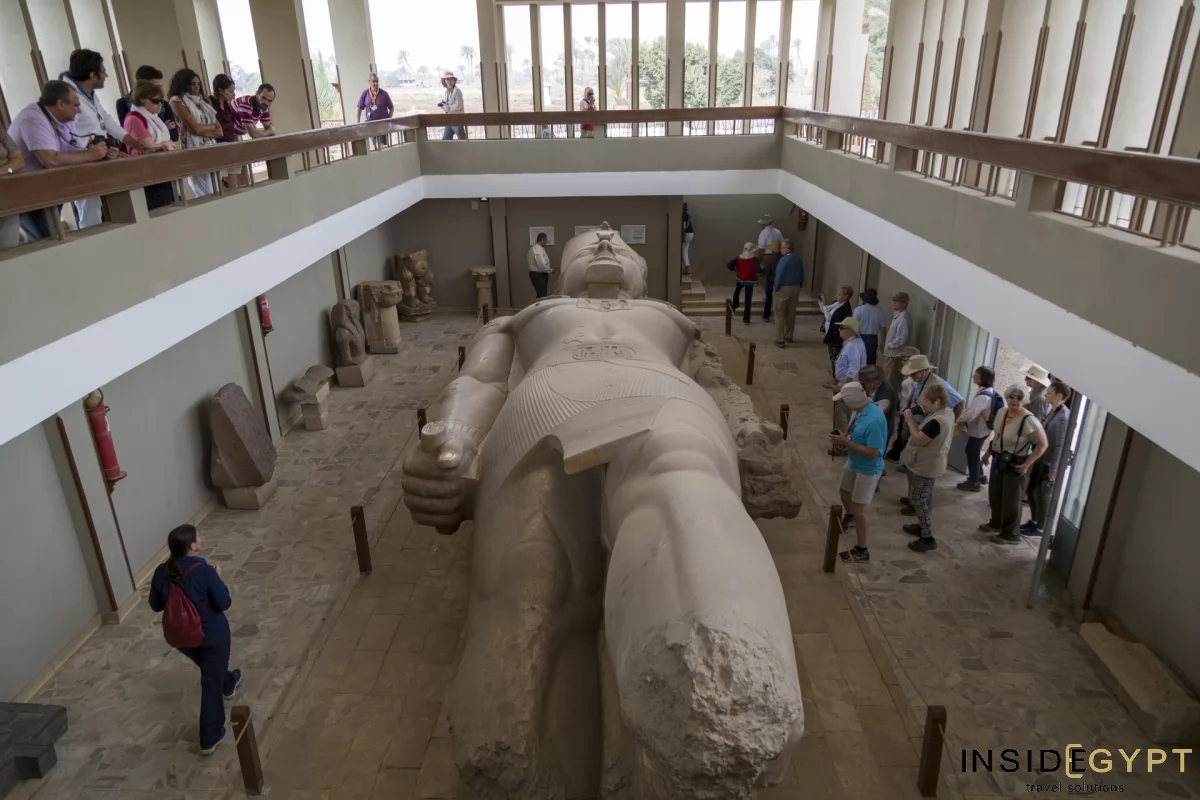

Discover Our Exclusive Egypt Tours
Tour Reviews
FAQ About the Ancient City of Memphis, Egypt
Where is Memphis Located in Egypt?
The ruins of the ancient Egyptian city of Memphis are situated near the modern village of Mit Rahina, on the west bank of the River Nile, approximately 25 km south of Cairo. This site, once Egypt's ancient capital, is a key location for those interested in exploring the rich history of this old Egyptian city.
To visit the ancient Egyptian city of Memphis, travelers can easily access it from central Cairo. The journey typically takes about 30 minutes by car or taxi, making it a convenient day trip for visitors. Taxis are widely available throughout Cairo, but it's advisable to negotiate the fare before beginning your trip.
Alternatively, you can take a private tour that includes transportation to and from Memphis. Tour companies offer packages that include knowledgeable guides, enhancing your experience with insightful information about the ancient capital of Egypt.
When planning your visit, it's a good idea to check local traffic conditions, as they can affect travel times. For those interested in combining their visit, consider exploring nearby attractions such as the Saqqara necropolis and the pyramids of Giza, both of which are easily accessible from Memphis.
With its historical significance and proximity to Cairo, visiting the ruins of Memphis provides a fascinating glimpse into the ancient civilization that thrived along the banks of the Nile.
How Did Ancient Memphis Get Its Name?
Memphis has its origins rooted in ancient history, tracing back to the ancient Egyptian term Ineb-Hedj, which means "White Walls." This name references the city's fortified walls that provided protection and symbolized its significance as Egypt's first capital. As a central hub of political and cultural activity in ancient Egypt, Memphis represented the strength and unity of the nation.
The Greek name "Memphis" is believed to derive from Men-nefer, a term closely associated with the pyramid of King Pepi I, located in the nearby necropolis of Saqqara. This connection to Pepi I highlights the city's importance as a royal center and one of the crucial ancient Egyptian capital cities. The name Men-nefer translates to "established and beautiful," further emphasizing the city's status and grandeur.
In addition to fortified walls and royal connections, the ancient city of Memphis was dedicated to the god Ptah, the Egyptian dity of crafts, architecture, and creation. This association further solidified its importance within the religious landscape of ancient Egypt.
For those interested in facts about Memphis Egypt, understanding the origins of its name offers valuable insight into the city's historical significance and the legacy of its rulers. The blend of cultural, political, and religious influences found in Memphis continues to make it a vital piece of Egypt's rich tapestry of history.
Was Memphis the First Capital of Egypt, and Are There Other Capitals?
Memphis is one of the oldest cities in Egypt, with origins tracing back over 5,000 years to the Early Dynastic Period. Memphis is recognized as Egypt's first capital, established by King Narmer around 3100 BCE during the unification of Upper and Lower Egypt. This city became the political and cultural heart of the nation, marking the beginning of a cohesive Egyptian state. As the capital of ancient Egypt, Memphis provided a strong foundation for the emerging civilization, serving as a center for trade, governance, and religious activities.
Throughout Egypt's extensive history, several other cities also served as significant capitals, each contributing uniquely to the country's development. Thebes (modern Luxor) emerged as a prominent city during the Middle and New Kingdoms, becoming a hub for the powerful pharaohs and the religious center of worship for the god Amun. The grandeur of its temples and monuments, such as the Karnak Temple and the Valley of the Kings, reflects its importance as an ancient Egyptian capital city.
Another noteworthy capital was Alexandria, founded by Alexander the Great in 331 BCE. This city became a major center of Hellenistic culture and learning, home to the famous Library of Alexandria and a melting pot of Greek and Egyptian traditions. Alexandria's role as a cultural and intellectual powerhouse set it apart from earlier, more ancient Egyptian capitals like Memphis and Thebes.
While Memphis was the first capital of ancient Egypt, cities like Thebes and Alexandria played crucial roles throughout different eras, each leaving its mark on the evolution of this ancient civilization.
What is There To Do in Memphis, Egypt?
In ancient Egyptian times, Memphis was the political and cultural center of the kingdom, making it one of the oldest cities in the world. As you explore the ancient ruins of Memphis, several attractions stand out due to their historical significance and grandeur.
Main highlights in Memphis, Egypt:
- Colossal Statue of Ramses II
One of the most impressive remnants of Old Egypt, the colossal statue of Ramses II stands at an astonishing height of around 10 meters (33 feet). Once located at the entrance of a temple dedicated to him, this statue exemplifies the artistry and architectural prowess of the Egyptians during this era.
- Alabaster Sphinx
Another significant attraction of the capital of ancient Egypt is the Alabaster Sphinx, a magnificent statue that embodies the fusion of human and animal forms typical of Egyptian art. This sphinx, carved from alabaster, showcases the artistic skill of the ancient Egyptians and serves as a testament to the city's cultural heritage.
- Remnants of Ancient Temples
Throughout the area, visitors can find the ruins of ancient temples dedicated to various deities. These ruins of Memphis include impressive columns and foundations that hint at the grandeur these structures once held. The temples are crucial to understanding the religious practices and architectural innovations of the Ancient Egyptian city.
- Sculpture from the Middle Kingdom later restored in the name of Rameses II
- Mit Rahina Museum
This open-air museum built around a magnificent fallen colossal limestone statue of Ramses II enhances the experience by housing a collection of key artifacts from ancient Memphis. It features a variety of relics, including statues, pottery, and tools that shed light on the daily life of Memphis's inhabitants. Of course, the main attraction of the museum is the impressive statue of Ramses II.
The site of ancient Memphis holds significant archaeological importance, as it provides insights into the life and culture of one of the earliest civilizations in history. Excavations have revealed artifacts, pottery, and inscriptions that help historians piece together the story of this once-thriving city. Memphis, Egypt, serves as a key to understanding the evolution of the socio-political landscape of the region, particularly during the Old Kingdom period.
How Can I Visit the Ancient City of Memphis?
Visiting the ancient city of Memphis, located approximately 25 km (15.53 mi) south of Cairo, offers a remarkable glimpse into Egypt's rich history. This site is easily accessible from Cairo. You can reach it by rental car, Uber, taxi, or through organized tours. The surrounding areas, including the modern cities and towns of Mit Rahina, Dahshur, Abusir, Abu Gorab, and Zawyet el'Aryan, are all part of the historical Memphis region, enhancing your experience with rich context and ancient landmarks.
When planning how to visit the ancient city of Memphis, it’s essential to consider ticket prices and opening hours. Adult tickets are currently priced at EGP 200, while students can enter for EGP 100. The site is open daily from 8:00 am to 4:00 pm, with adjusted hours during Ramadan from 9:00 am to 3:00 pm. Arriving early helps avoid crowds and makes the most of your visit. Ticket prices and opening hours may vary, so visitors are encouraged to check locally before planning their visit.
For a truly enriching experience, consider joining one of Inside Egypt's guided tours, which offers a comprehensive exploration of Memphis with expert commentary that brings the ancient site to life. These tours not only provide insightful historical context but also guide you through the most significant ruins and artifacts. To make your trip to Memphis enjoyable, be sure to wear comfortable shoes, stay hydrated, and take time to appreciate the beauty of the ancient monuments that played a crucial role in Egypt's past.
What Are Some Interesting Facts About Memphis, Egypt?
Memphis, Egypt, holds a significant place in ancient history, serving as Egypt's first capital and a vital religious center dedicated to Ptah, the Egyptian god of creation and craftsmanship. Established during the Early Dynastic Period, Memphis was strategically located at the crossroads of trade routes, which allowed it to flourish as a hub of commerce and politics. This city not only became the capital of Egypt but also played a crucial role in the administration and cultural life of the nation, leading to its nickname as the "First Capital of Ancient Egypt".
The grandeur of Memphis can be seen in its impressive monuments, including the magnificent temple of Ptah, which was a focal point for worship and ceremonies. The city was home to various important figures, including the Pharaohs, who sought to solidify their power and influence from the capital. However, as Alexandria rose in prominence during the Hellenistic period, Memphis began to decline, gradually losing its status as the primary center of power in Egypt.
Today, ongoing archaeological discoveries in the area continue to unveil the rich tapestry of Memphis' history. Excavations have unearthed artifacts, statues, and structures that provide valuable insights into the daily life, trade practices, and religious beliefs of ancient Egyptians. These fascinating facts about Memphis in Egypt underscore its historical significance and the enduring legacy of a city that was once the heart of Egyptian civilization.
As researchers and archaeologists work to uncover more about Memphis, the stories of its past and the contributions it made to Egypt's cultural heritage continue to emerge, reminding us of what Memphis truly was—a pivotal city in the journey of Ancient Egypt.
Discover Our Exclusive Egypt Tours
Discover the wonders of Egypt with Inside Egypt's exclusive tailored tours, which provide an in-depth and luxurious exploration of the country's ancient treasures, including the ancient city of Memphis. Our tours blend adventure and education as they highlight significant historical sites while immersing travelers in the rich culture of Egypt, both past and present. With a focus on small group sizes and personalized service, we ensure exclusive access to sites and experiences unavailable to larger tour operators.
Inside Egypt's experienced tour guides, all esteemed Egyptologists, are handpicked for their extensive knowledge and warm friendly personalities, enhancing each traveler's journey through this captivating land. Our tours are meticulously designed to foster a connection with the Egyptian people and their diverse cultures, making sure that your vacation is not only enjoyable but also enriching. Each package is thoughtfully curated to include luxurious accommodations, meals, and VIP experiences that elevate the travel experience.
Our seven best luxury Egypt tours cater to various interests and preferences:
- The 17-Day Egypt Tour offers a comprehensive experience with 14 nights aboard a cruise, 2 nights in Cairo, domestic flights, meals, guided tours, and exclusive VIP access to the Giza Plateau, the Great Pyramid, and the Great Sphinx.
- The 15-Day Siwa Oasis Tour features 6 nights in 5-star hotels in Cairo, 4 nights on a Nile cruise, and a unique stay at the Taziry Ecovillages Siwa.
- If you prefer a broader overview, our Around Egypt in 14 Days tour provides a mix of 6 nights in Cairo and 7 nights on a Nile cruise.
- An intimate 12-day luxury Dahabiya Nile cruise, offering tranquil sailing and expert-guided visits to Egypt’s most iconic temples.
- The Exploring Egypt (10 days) and Golden Highlights of Egypt (8 days) tours also offer fantastic opportunities to discover the wonders of Giza, the Nile, and much more.
- Lastly, experience our extraordinary 7-Day Egypt Total Solar Eclipse Tour, which combines sightseeing with the unique event of the total solar eclipse.
Each tour promises an unforgettable journey through one of the most remarkable civilizations in history.
What People Say About Our Tours Featuring Ancient Memphis
Here are three customer reviews that highlight the exceptional quality and unique experiences offered by Inside Egypt tours, particularly focusing on the ancient city of Memphis.
Wayne Richardson: "Our visit to Memphis with Inside Egypt was a breathtaking journey through history. The moment we stood before the magnificent alabaster sphinx, it felt like stepping back in time. The guide’s insights truly enriched our understanding of these extraordinary landmarks."
Candice McKenzie: "Our tour of Memphis with Inside Egypt was nothing short of extraordinary. The guides were incredibly knowledgeable, offering insights that brought the ancient ruins to life. Standing before the colossal statues was a truly unforgettable experience!"
Jackie Naish: "The Inside Egypt tour of Memphis was an eye-opener! The attention to detail and the personal stories shared by our guide gave us a deeper appreciation for this ancient city. I left feeling inspired and enriched by the experience."
Other Sites Nearby
Here's a list of nearby attractions that complement your visit to Memphis, Egypt, enhancing your itinerary with remarkable historical and cultural experiences:
Pyramids of Giza
Located just a short drive from Memphis, the Pyramids of Giza are among the most iconic structures in the world. The Great Pyramid of Khufu, the Pyramid of Khafre, and the Pyramid of Menkaure are extraordinary feats of ancient engineering, and the nearby Sphinx adds to the awe of this remarkable site.
Saqqara
This ancient burial ground, just south of Memphis, is home to the famous Step Pyramid of Djoser, considered the world's oldest stone monument. Saqqara offers a wealth of tombs and pyramids that showcase the evolution of Egyptian architecture and provide insight into the burial practices of the pharaohs.
Dahshur
Known for its well-preserved pyramids, including the Bent Pyramid and the Red Pyramid, Dahshur is a lesser-visited site that allows for a more intimate exploration of ancient Egyptian architecture. The unique shape of these pyramids signifies the transition in pyramid construction, making it a must-see for history enthusiasts.
Abusir
Located near Saqqara, Abusir is notable for its less-crowded pyramids and the remains of several royal tombs. The site presents an opportunity to explore the funerary temples and the ancient necropolis that showcases the evolution of pyramid design.
Creating an itinerary with these attractions will allow you to experience the breadth of ancient Egyptian civilization, offering a cohesive journey through history that complements your exploration of the ancient city of Memphis.

